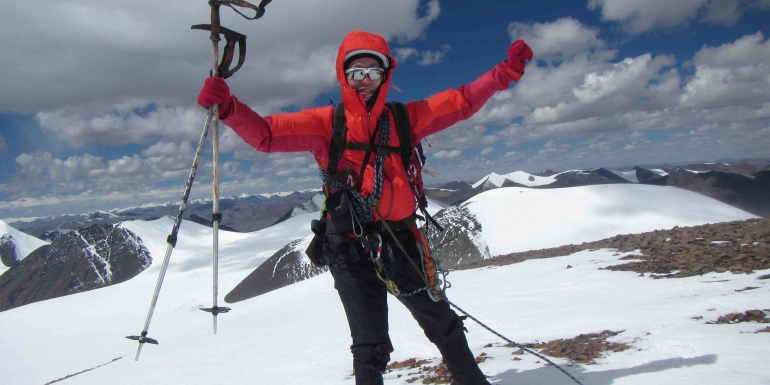Lessons from Qinghai’s Mystery Mountain
by David Lim
Sometimes you have to leave the comforts of home to find out what you are made of. And thus began the adventure this year to seek the group of mysterious mountains situated in remote southwest China in Qinghai. From outerspace, they look just like a smear of white against the brown plains of the Tibetan plateau. Located just about 100 kilometres from the northern Tibet border, the glaciers centred around Longyala Peak ( 6104-metres above sea-level) fanned out like broad spokes of a wheel from a central hub. None of the peaks in this area had been climbed and Google does not have a single clear photograph of any of them.
For two –days, we were driving in very inhospitable terrain to identify the right glacial snout from which to launch our expedition. It was over these eight days that I learn and re-learnt some valuable lessons in leadership.
- Beware of confirmation bias affecting decisions.
On at least two occasions, I thought we were at the location in which we had planned to be. So keen was I to start climbing that I began to fit peaks and features on our decades-old Russian Army maps to what I could see. In short, I began to inadvertently believe we were in the right place by matching and confirming information that supported my viewpoint. I quickly snapped out of this after a day, and realized we were way off course, and decided to move our camp to another location 3 hours away.
In a workplace environment, do we have people around us who are happy to challenge our viewpoint when that viewpoint merely seeks information to merely confirm we are on the right path? Cultivate such people so that you make high quality decisions and not be blindsided
- Don’t take the easy route
Carrying a large pack of over 20 kilos at altitude is similar to running a race on a 400-metre track. At the end of a minute or so of hard work, you stop, our of breath, and then rest. The difference on a mountain is that you will need to repeat the cycle of work and rest several hundred times, and a long load carry. At times ike this, it’ is easy to give up short of an ideal campsite. This is what happened to us, and I had to cajole, persuade and push my team mate to carry on as far up the glacier as possible to put us in an advantageous site. Once we pinned down our tent and equipment, it would take an enormous effort to make changes. Very often, the last 10%of effort pays a 100% dividend later.
Too often, in my opinion, we give up, just as we start to see the payoff, and all the effort to that point is often wasted. Simply refuse to take the easy way out when you know that payoff is well worth the extra effort
- Any fool can suffer, make sure you suffer for a reason
One of the hallmarks of a good mountaineer is the ability to tolerate moderate levels of discomfort for protracted periods of time. Imagine for a moment, spending a week, sleeping ,eating, cooking and changing, all in a tent with a footprint no larger than a single-superior bed. Imagine a tent so small, when you smile, your teeth touch the walls. I exaggerate of course, but not about the actual size of the tent. A quarter inch foam mat separates you and the ice beneath, and you can hear the groaning and crackling glacier underneath as it pops, and snaps as it moves downhill an inch at a time. There’s a squalor in a tent as you try to eat and drink hot food and liquids without getting any into your clothes, hair and equipment. Snoring, farting, coughing blend seamlessly into a night when temperatures drop to minus 15ºC, and you still have to ventilate the tent. Or, if you prefer, sleep warmer to wake up with a coating of frozen moisture in the form of hoar-frost all over you sleeping bag , clothes and the roof of the tent. The principle here is not that suffering is welcome, it’ s that any fool can suffer. Smarter people suffer for a good reason, and find ways to make this suffering a part of the whole process to achieve a goal. Too often we forget, in our whiny, whimpering selves, why we do what we do; instead of focusing on the the big pay off, and the suffering , a necessary part of that journey
- Redefining Success
On Sep 23rd 2012, after a short if very windy climb, Rozani and I stood on a nameless, virgin peak, in a remote glacier in a remote region, being very surely the first humans ever to explore and climb in this massif. That in itself took the edge of the 80 km/h gusts that raked the top of the peak. The summit itself was at or nearly at 6000 –metres. Not a bad effort I said to myself at the time.
Two days later, we attempted our main objective, the virgin Longyala Peak at 6104m. Rozani was not moving fast and I had to keep motivating him and pushing the pace. Eventually, I led from the camp in pre-dawn hours all the way to the 6000-metre lower summit. From there, we gazed at the remaining route to the top, Unlike the view that the ridge presented from below, we would have to drop 50-metres and then re-ascend south-facing corniced ridges for another 100 metres. On one section , the unstable overhanging ice fringes or cornices shifted direction and faced north. Looking at our time left, and energy level, and the risks involved, we decided not to proceed further. Had we missed tagging the top of our main objective? Yes. Had we succeeded in making the highest virgin peak ascent by any SouthEast Asian mountaineer? Definitely. In work and life, it pays never to define success too narrowly. Externalities change, expected performances don’t come up to par, and the most enthusiastic people I have met are constantly reframing challenges without selling out on the main elements of a goal.
DAVID LIM is Asia’s Leaders’ Mentor and can be found at http://www.davidlimspeaks.com, OR at [email protected]



